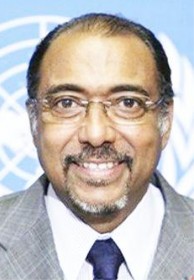A decision made by the Delhi High Court in India to annul a law criminalizing “carnal intercourse against the order of nature” has been lauded by UNAIDS, which has indentified it as a major feat in ensuring the full respect of human rights in India and urged other governments to follow suit.
The court declared that section 377 of Indian Penal Code violated Articles 14, 15, 19 and 21 of the Indian Constitution and said consensual sexual acts of adults in private should not be criminalized. The law had been in existence for 150 years.
A division bench of Chief Justice A.P Shah and Justice S. Murlidhar said, “The inclusiveness that Indian society traditionally displayed, literally in every aspect of life, is manifest in recognizing a role in society for everyone.”
UNAIDS Executive Director Michel Sidibé said that “the Delhi High Court has restored the dignity and human rights of millions of men who have sex with men and transgendered people in India.” He added, “Oppressive laws such as Section 377, drive people underground making it much harder to reach them with HIV prevention, treatment and care services.

“UNAIDS strongly welcomes the decision to repeal the law and looks forward to working with the Indian government on moving the AIDS response forward for men who have sex with men and transgendered people,” said Sidibé. “It sends a positive message to countries, where such laws still exist.”
UNAIDS, in a release, called on all governments to ensure full respect for the human rights of men who have sex with men, lesbians and transgendered people through repealing laws that prohibit sexual acts between consenting adults in private; enforcing laws to protect these groups from violence
and discrimination; promoting campaigns that address homophobia and transphobia, and ensuring that the crucial health services are met.
According to the release, “the criminalization of adult sexual behaviour is hampering HIV responses across the world.” The statement added that “such measures have a negative impact on delivery of HIV prevention programmes and access to treatment by people living with HIV.
Not only do they violate human rights of individuals, but further stigmatize these populations.”
Currently, more than 80 countries in the world have legislation that prohibits same sex behaviour. On the South American continent the only country where such laws exist, is Guyana, the release stated.
In the 2006 United Nations Political Declaration on HIV/AIDS, governments committed to removing legal barriers and passing laws to protect vulnerable populations.
Countries that have non-discrimination laws against men who have sex with men, injecting drug users and sex workers have provided better access to HIV prevention, treatment, care and support.





